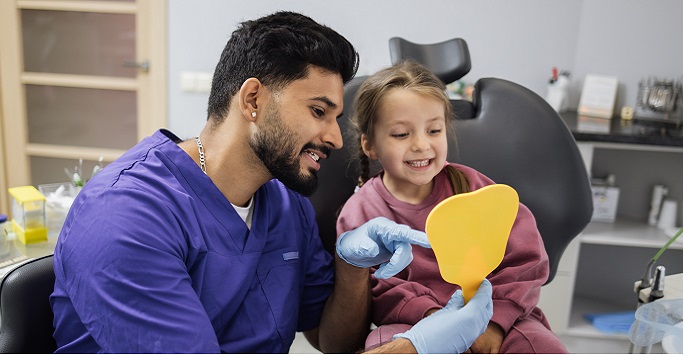
Dr Deborah Moore is a Senior Clinical Lecturer working across the Department of Public Health, Policy and Systems and the School of Dentistry, and Dr Janine Yazdi-Doughty is an NIHR Clinical Lecturer in Primary Care, School of Dentistry and NHS Community Dental Service. Here they share how they are involving patients and the public in different aspects of their oral health research.
Dr Deborah Moore
I’m currently developing a proposal for a research funding application, to co-develop a community-based prevention and early treatment service for managing tooth decay in pre-school children. To shape the application, I've been speaking to parents, carers and staff at Family Hubs in Halton and Knowsley.
Family Hubs bring together a range of integrated early help, including social and peer support, childcare, and child health services. So far I've held 16 one-to-one or small group informal conversations with parents and carers attending activities or appointments at the Family Hub. Contributors were re-reimbursed for their time with a £10 shopping voucher, secured from the University of Liverpool IPH Patient and Public Involvement and Engagement (PPIE) fund.
Contributors felt that Family Hubs or Nurseries were convenient places for pre-school children to receive a dental check and early treatment, and they were excited about the proposal. Family Hubs were seen as more ‘child friendly’ than dental clinics; especially important for children with additional support needs / neurodiversity.
As a result of the feedback, I'm planning to include more general advice alongside the SDF intervention, as parents and carers had lots of questions on establishing good oral health routines and accessing services. The conversations have shaped a workstream to co-create information and consent resources and processes, and contributors shared where they would be most likely to hear about taking part in such a study if it was to go ahead. Several contributors gave their email addresses as they were keen to be involved at a later date. I now plan to seek the views of primary school children on the proposal, in addition to parents and carers.
Dr Janine Yazdi-Doughty
I’m leading a co-produced scoping review to explore what is known about the drivers, experiences and consequences of oral health stigma. To date, people with lived experience of oral health stigma have been involved in identifying the importance and relevance of the research question, key words for the search strategy, and describing their understanding of the concept of oral health stigma. Oral health related stigma has been identified and defined as a unique health stigma that harms people and groups with oral health that differs from the prevailing cultural norms.
Contributors were identified through the NIHR People in Research website and first completed a short survey to identify their thoughts about different oral appearances and their own relevant lived experiences of oral health stigma. Words associated with the appearance of a healthy smile and teeth included being neat, immaculate, pretty, lucky, trustworthy and confident. Words associated with oral diseases were strongly emotive and included ugly, horrific, frightening, criminal, chaotic, lazy and others. Thereafter, contributors were invited to attend a small group discussion. Contributors felt that oral health stigma was an important issue and was becoming increasingly prevalent in society as a result of social media.
As a direct result of the survey responses and the PPI group discussion we have adapted the search terms used, modified our research question and limited the scope of the literature to include only qualitative data that can be co-analysed by researchers and patients and the public. Contributors and co-researchers will be compensated for their time at NIHR Involve rates using funding secured from the University of Liverpool IPH PPIE fund.